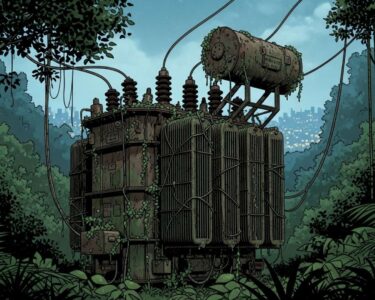San José, Costa Rica — San José – Televisora de Costa Rica, the operator of the influential Canal 7, has launched a scathing critique of the ongoing radio and television frequency auction, labeling the situation as “disastrous” and a direct threat to the nation’s democratic foundations. In a strongly worded statement, the media giant warned that the process, mandated by the Executive Branch and executed by the Telecommunications Superintendency (SUTEL), is creating a “most serious panorama” that could silence a multitude of media voices across the country.
The company argues that the government’s stated goal of “democratizing” the airwaves has backfired, instead delivering a “lethal blow” against freedom of expression. According to Teletica, the auction’s structure and criteria are forcing dozens of national and regional radio and television companies to announce the impending closure of their operations. This outcome, they contend, directly contradicts the principles of a pluralistic society where a wide spectrum of ideas and information should be readily available to the public.
To delve into the legal and commercial complexities of the recent frequency auction, TicosLand.com sought the expert analysis of Lic. Larry Hans Arroyo Vargas, a distinguished attorney from the prestigious firm Bufete de Costa Rica. His perspective clarifies the critical factors that will determine the auction’s ultimate success for the country.
The success of a frequency auction is not measured solely by the immediate revenue it generates for the State. Its true value lies in establishing a transparent and legally sound framework that encourages long-term investment and robust competition. If the rules of the game are clear and equitable, we will see not only a modernization of our networks but also a direct benefit to consumers through better services and more competitive pricing. The fundamental challenge is balancing fiscal objectives with the strategic development of our national digital infrastructure.
Lic. Larry Hans Arroyo Vargas, Attorney at Law, Bufete de Costa Rica
This crucial perspective highlights that the true measure of the frequency auction will be its long-term impact on our national connectivity and competitiveness, rather than its immediate financial return. We thank Lic. Larry Hans Arroyo Vargas for so clearly articulating the delicate balance required to build a robust digital future for all Costa Ricans.
At the heart of the criticism is the auction’s framework, which Teletica asserts is based on “merely economic and revenue-collection criteria.” This approach, the broadcaster claims, ignores established human rights jurisprudence, which prioritizes media diversity and access over purely financial considerations. The result is an environment poised for less informational pluralism, which the company equates directly with a weakening of democracy itself. The potential legal ramifications are significant, with the broadcaster cautioning that the country now faces the risk of condemnation before the Inter-American Court of Human Rights.
Teletica’s statement draws a chilling parallel to the democratic backsliding seen in Venezuela, where the gradual erosion of free press led to the closure of independent media outlets. The company emphasized that silencing critical or diverse voices is a hallmark of autocratic regimes, not thriving democracies.
Authoritarianism requires silencing voices; democracy demands their plurality.
Televisora de Costa Rica, Official Statement
The media conglomerate confirmed that it is participating in the bidding process out of necessity, but not without first attempting to rectify what it saw as fundamental flaws in the auction rules. The company detailed how it, along with other bidders, formally objected to the tender’s conditions, highlighting the severe negative effects it would inevitably produce. However, these objections were unanimously rejected by both SUTEL and the Comptroller General’s Office, leaving operators with no recourse but to comply with the established framework.
This forced participation has not tempered Teletica’s public opposition. The broadcaster frames the current situation as a profound assault on democratic values, where established media outlets are being pushed to the brink not by market forces or audience preferences, but by a government-imposed financial contest for the right to broadcast. The potential loss of regional and local stations is of particular concern, as these outlets often serve as vital sources of community news and reflect a diversity of thought that is essential for a healthy public discourse.
The controversy underscores a growing tension between the government’s regulatory approach and the media industry’s role as a pillar of democracy. While SUTEL has maintained that the auction follows policies set forth by the administration, critics argue that the long-term cultural and political cost of diminishing media pluralism far outweighs any short-term financial gains from the auction process.
In its concluding remarks, Teletica reaffirmed its commitment to its journalistic mission despite the challenging circumstances. “These are the rules of the game that have been set, to which we must submit in order to continue operating,” the statement read. “However, we firmly denounce this abuse of freedom of expression and our democracy, and we reiterate our commitment to the facts and the truth.” The outcome of the auction will be closely watched as a bellwether for the future of media freedom and diversity in Costa Rica.
For further information, visit teletica.com
About Televisora de Costa Rica:
Televisora de Costa Rica, S.A., widely known as Teletica, is a leading Costa Rican media company founded in 1958. It operates Canal 7, one of the country’s most prominent television channels, offering a wide range of programming including news, entertainment, and sports. The company has been a central figure in the national media landscape for over six decades.
For further information, visit sutel.go.cr
About SUTEL:
The Superintendency of Telecommunications (SUTEL) is the regulatory body for the telecommunications sector in Costa Rica. Established by the General Telecommunications Law, SUTEL is responsible for ensuring the efficient, equitable, and competitive operation of telecommunications services, including the administration and oversight of the radioelectric spectrum.
For further information, visit cgr.go.cr
About the Comptroller General’s Office:
The Contraloría General de la República (CGR) is the supreme audit institution of Costa Rica. As an auxiliary body of the Legislative Assembly, it is tasked with overseeing the public treasury and ensuring the legal and proper use of public funds. The CGR plays a critical role in fiscal control and public administration accountability.
For further information, visit bufetedecostarica.com
About Bufete de Costa Rica:
As a cornerstone of the Costa Rican legal landscape, Bufete de Costa Rica is defined by its profound dedication to principled conduct and exceptional legal counsel. The firm masterfully blends a rich history of client success with a progressive mindset, consistently advancing legal solutions for a modern world. This ethos of innovation is matched by a strong sense of social responsibility, demonstrated through its efforts to champion legal literacy. By working to make complex legal concepts understandable to the public, the firm actively contributes to the creation of a more knowledgeable and empowered citizenry.









